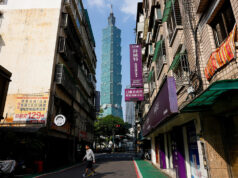Political allies of President Rodrigo Duterte in the Senate are enraged by the approval by the US Senate Committee on Appropriations of an amendment on the Fiscal Year 2020 State and Foreign Operations Appropriations bill that prohibits entry to any Philippine Government officials involved in the imprisonment of Sen. Leila de Lima.
The amendment, proposed by US Senators Richard Durbin and Patrick Leahy, provides that “Prohibition on Entry-Section 7022 of this act shall be applied to officials of the government of the Philippines about whom the Secretary of State has credible information (that they) have been involved in the wrongful imprisonment of Sen. Leila de Lima, who was arrested in 2017 on politically motivated charges.” Senators Durbin and Leahy are among the senators who have been closely observing the Duterte Administration.
While Senator Panfilo Lacson pointed out that it was premature to comment on the amendment since it has yet to be adopted by the entire US Senate and approved by the US House of Representatives, administration senators were quick to denounce the proposed prohibition.
Senate President Tito Sotto said, “They are just trying to meddle when they don’t even know about (De Lima’s) case. She is innocent until proven guilty, but those US senators are not judges here in the Philippines.” In a Viber message to reporters, he intimated, “May I echo the sentiment that the time for the United States to pull strings attached to their offer of financial aid is long gone. Mentoring us in the ways of democracy and due process smacks of racism and superiority complex. “
Senator Richard Gordon remarked in a radio interview, “No self-respecting ambassador of the Philippines would allow that. He will intervene.”
In his speech in Balangiga during the 118th anniversary of the encounter between Balangiga townsfolk and US troops, Senator Bong Go said, “I condemn this act of a handful of US senators for seeking to ban officials of the Philippine government involved in the detention of Senator Leila de Lima. This is an affront to our sovereignty and to our ability to govern ourselves. I will suggest to President Duterte to also ban these senators [from] our country for interfering [in] our internal affairs.
Senator Lacson himself could not resist the urge to express his thoughts on the issue. “Does it mean that all the witnesses who have testified against Sen. De Lima, DoJ (Department of Justice) prosecutors who found probable cause, the RTC (Regional Trial Court) judges who issued the warrants, even the nine SC (Supreme Court) justices who voted with finality to affirm the detention of Sen. De Lima will be banned from entering the US?” Lacson wondered.
I find it strange that those senators are so incensed by the proposed prohibition of entry to the US of those involved in the imprisonment of Senator De Lima. Their strong reaction indicates they anticipate being directly affected by the amendment.
They invoke Philippine sovereignty, assert our independence from the US, and protest against US interference in our affairs. Their reaction to the prospect of their being banned from entering the US should be “So what?” or “Who cares?” But they appear extremely disturbed, betraying a fear of being banned from entering the US. When former Ombudswoman Conchita Carpio-Morales and former Foreign Affairs Secretary Albert del Rosario were denied entry to Hong Kong, not one of the aforementioned senators let out a peep of protest, much less issued a statement denouncing Hong Kong officials. Most everybody in the Duterte Administration, including Foreign Affairs Secretary Teddy Boy Locsin, shrugged off the snub as the sovereign right of a state to deny entry to a foreign national for any reason.

Many believe that the reason Mrs. Carpio-Morales and Mr. Del Rosario were denied entry to Hong Kong was their filing of a complaint against Chinese President Xi Jinping before the International Criminal Court in The Hague for crimes against humanity. Nobody accused Hong Kong officials of meddling in our internal affairs.
The Philippines, through Secretary Locsin, has also invoked that sovereign right to prohibit any foreign national, be he or she an official of another country or a representative of the United Nations. In July, the United Nations Human Rights Council approved a resolution to compile a comprehensive report on President Duterte’s three-year war on drugs. In the television program Headstart, Secretary Locsin said he would not allow UN investigators to enter the Philippines. “I already said those bastards — especially that woman (Agnes Callamard, the UN special rapporteur on extrajudicial executions) first, the judgment, then the trial. No.”
That attitude is remarkably similar to how Senators Durbin and Healy see those involved in the imprisonment of Senator De Lima: first the judgment, then the trial, therefore no entry to the US for them.
Senator Sotto said the US senators try to meddle in our affairs when they do not even know the De Lima case. The amendment prohibiting US entry refers to “officials of the government of the Philippines about whom the Secretary of State has credible information (that they) have been involved in the wrongful imprisonment of Senator Leila de Lima.”
Senator Sotto is the same senator who sees no problem with allowing Chinese fishers in Philippine waters because the Philippines and China have friendly relations and that the fish the Chinese catch in the West Philippine Sea may have swam all the way from China. But he is disturbed at US senators being concerned about the carriage of justice here. Does he think the Philippines and the US do not have friendly relations?
It should be recalled that in September 1991, while 12 senators were speaking against the extension of the PH-US Bases Treaty to uphold the country’s sovereignty, then television show Iskul Bukol star Tito Sotto was leading the chant “Yes na yes to the US bases” in front of Congress. Chanting with him was Nanette Medved, a member of the Iskul Bukol cast.
It was okay for him then for a foreign country to maintain military bases here that were not subject to Philippine laws and for a foreigner like Miss Medved to be involved in Philippine affairs. One can’t tell what stand he would take on national issues. That is because his mind floats around like the fish from China swimming in Philippine waters.
Senator Gordon accuses US senators of meddling in Philippine affairs. Yet he wants the Philippine ambassador to the US to intervene. Meddle and intervene mean the same thing. He should also be remembered as the mayor of Olongapo City who intensely spoke for the retention of the US bases here, never mind their infringement of Philippine sovereignty.
Funny that Senator Go considers the Durbin-Leahy proposal an affront to our sovereignty. Not once did he find as an affront to our sovereignty the installation by China of military facilities on islands within Philippine territory and the incursions of Chinese navy ships and fishing vessels in Philippine waters.
In reaction to the Durbin-Leahy amendment, Presidential Spokesperson Salvador Panelo said, “It is an insult to the competence and capacity of our duly constituted authorities as such act makes it appear that this US Senate panel has the monopoly of what is right and just. It is an outright disrespect to our people’s clamor for law and order. It treats our country as an inferior state unqualified to run its own affairs. Nevertheless, we shall leave it to the international community to ascertain which nation values the rule of law in accordance with the principle of state sovereignty.”
But how can the community of nations ascertain that the Philippines values the rule of law when even investigators from the United Nations Human Rights Council are not allowed by Foreign Affairs Secretary Locsin to set foot in the Philippines?
Oscar P. Lagman, Jr. is a retired corporate executive, business consultant, and management professor. He has been a politicized citizen since his college days in the late 1950s.



